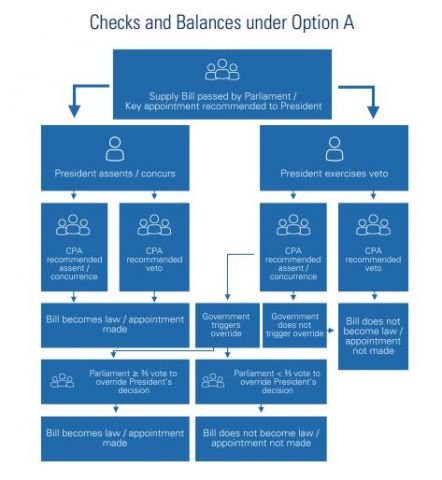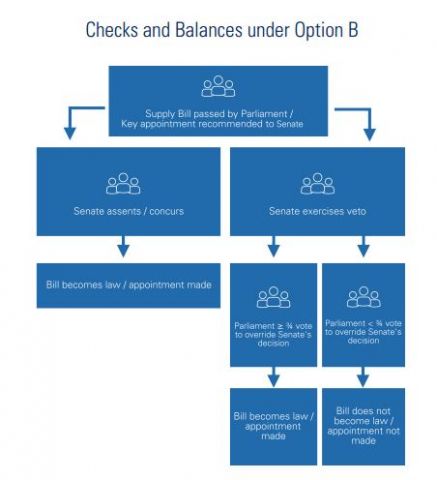The Workers’ Party has released a position paper detailing its opposition to the Government’s proposed changes to the Elected President (EP) system. In the paper, the Opposition party suggested that a Senate should be set up to take over the custodial duties of the EP, and that a national referendum should be held for Singaporeans to choose between the two set of proposals. The WP’s position paper is reproduced below in full.
1. The President Should Not Become an Alternative Centre of Political Power and an Elected Body Should Safeguard the Nation’s Reserves
1.1 In January this year, when the Prime Minister announced that the setting up of a Constitutional Commission to study changes to the Elected Presidency, he said that the President cannot be an alternative centre of power. In September, when the Law Minister rebutted the Constitutional Commission’s alternative proposal to replace the Elected Presidency with an appointed council of experts, he said that the president must himself be elected to have the popular mandate to veto an elected government.
1.2 The Workers’ Party agrees with the Government on these two fundamental principles. First, the President should not become an alternative centre of power with the potential to undermine the sovereign authority of Parliament. Second, our national reserves need to be safeguarded and the body safeguarding the reserves would need to be elected to say the ‘no’ and to force a debate on Parliament.
1.3 This has been the Workers’ Party’s position when the Elected Presidency was first introduced in 1991. We believe that an Elected President should not fetter the supreme power of Parliament as the people’s representative. The Presidency should be a dignified ceremonial office and the President should focus on performing his or her role in fostering national unity and representing Singapore to the world. We also believe that the past reserves should be safeguarded, but that this custodial function should lie with elected representatives of the Legislature.
2. Tightening the Elected Presidency and Strengthening the Council of Presidential Advisers to Check the President Complicates the Problem
2.1 We disagree with the Government that the solution to the current problem is to tighten the qualifying criteria for the Elected Presidency and strengthen the Council of Presidential Advisers (CPA).
2.2 In tightening the qualifying criteria for the Elected Presidency, the Government seeks to lessen the potential for the Presidency to become an alternative centre of power by severely reducing the number of qualifying candidates and restricting the pool to the super-elite executives in the private and public sectors. This is based on the mistaken premise that candidates from such a super-elite pool are immune to politicization and will not become an activist President.
2.3 The Government has refused to recognize that the problem is inherent to the Elected Presidency by virtue of a popular mandate. Unlike the typical Member of Parliament, the Elected President is elected by the whole nation to represent the country without any party affiliation. The competitive election process pitting individuals against each other compels candidates to offer platforms to attract votes. The outcome of such a popular election tempts candidates to use the percentage of votes garnered as an indication of popular endorsement and the elected candidate to claim a mandate beyond his or her constitutional powers.
2.4 The Government had recognized that, even with existing discretionary powers, we run the risk in the Elected Presidency of placing too much power in one person to properly check a popularly elected Parliament. The Council of Presidential Advisers was set up to moderate this risk, by endowing the Elected President with a team of advisers so that his or her decisions would always have the benefit of a group of experts and/or experienced persons.
2.5 Again, in order to further moderate the risk of the Elected Presidency having too much checking power, the Government is turning to the unelected Council. By expanding the Council from six to eight members and obliging the President to consult the Council on all monetary matters related to the reserves and all key public service appointments, the Government is not merely strengthening the Council’s advisory capacity, but is changing the very nature of the Council beyond its advisory function.
2.6 In attempting to create another check, namely the strengthened Council, on the original check, namely the Elected Presidency, the Government’s approach will create a third key for safeguarding the reserves. When the President disagrees with the Government, the strengthened Council will be empowered to settle the decision on the side of either party. This makes the Council another alternative centre of power. This approach risks politicizing the office of the Presidency further, by placing the Elected President in a situation where he will be caught in a three-way faceoff in making crucial custodial decisions. This approach also risks producing complicated three-way situations that could end in gridlock and the erosion of the legitimacy of the elected Government. An unelected Council should not have the potential to create such outcomes.
2.7 The Government’s proposal to reserve an election for an ethnic community if the past five Elected Presidents did not come from that ethnic community does not solve the problem. Over a long period, our Presidents should come from the main ethnic communities to symbolize and express the multiracial fabric of our nation. However, tying this important symbolic role to the electoral process risks politicization of the role. As the ethnicity of the candidates will be pushed into the glare of competitive elections in reserved elections, this will inadvertently lead to the politicization of multiracialism and even introduce communal interests into the contest.
3. Reverting to the Ceremonial Presidency and Establishing an Elected Senate to Fulfill the Custodial Role is the Solution
3.1 We studied and deliberated on the Constitutional Commission’s report and agreed that the most elegant solution to the problem is the Commission’s alternative proposal to revert to an appointed ceremonial Presidency and to set up a group of experts to exercise the custodial role. However, as the body performing a check on Parliament should have the popular mandate, we believe this group of experts should be popularly elected.
3.2 We propose that a Senate be established within our Legislature as an Upper House to exercise the custodial functions that are now exercised by the Elected President. Eight Senators shall be elected from a list in periodic elections where non-partisan candidates will have to fit the qualifying criteria. A Senate Elections Committee will select the most suitable sixteen candidates to stand for the Senate election. Properly mandated by popular elections, the Senate will take over the custodial powers of the Elected Presidency. A Senate veto will return relevant bills to Parliament for debate which Parliament can veto with ¾ majority. As part of the legislative arm of the State and not the executive arm, and mandated to fulfill a limited custodial role, Senators would be under no illusion of having any executive or policymaking function. It is the Workers’ Party’s belief that such a two-chamber legislative system will minimize gridlock and enhance constructive politics.
3.3 With the establishment of a Senate, the Presidency shall revert to an office appointed by Parliament with no custodial role to perform. By focusing on unifying Singaporeans and representing Singapore to the world, the dignity of the office will be preserved and protected from the risk of politicization inherent in electoral competition and in checking Parliament and being checked by an appointed Council. Parliament shall consider the multiracial character of society and factor in multiracial representation when making the appointment. This way, the symbolic role of representing our coveted multiracialism will also be preserved and protected from politicization.
4. The Proposed Constitutional Amendments are Major Changes that Should Not Be Made with Indecent Haste and Should Be Put to a Referendum
4.1 The amendments to the Constitution that the Government has proposed are farreaching and wide-ranging, and deserve much longer airtime where the changes can be subjected to proper and thorough public debate. Any changes made with indecent haste will expose the Government to suspicions and accusations that it is seeking to shape the terms and outcome of the election, when the country is on the verge of the next Presidential Election.
4.2 In the amendments proposed by way of the new Articles 5A, 5B and 5C, the Government has affirmed the utility, desirability and legitimacy of a national referendum in introducing controversial changes to presidential candidate eligibility. Given that the Prime Minister has acknowledged its proposed fundamental changes to the Presidency are controversial and potentially unpalatable to many members of the public, 3 we believe that a national referendum on these proposed amendments should be held after an appropriate period of public debate.
4.3 The public should be presented with a simple choice between the Government’s proposed amendments and the Workers’ Party’s proposal as outlined in this paper. The two options represent the main ideas mooted by the Constitutional Commission with minor modifications. As such, we believe the referendum questions should be marked in non-partisan manner as simply Option A and Option B, as represented below. A simple majority should suffice to decide the referendum.







